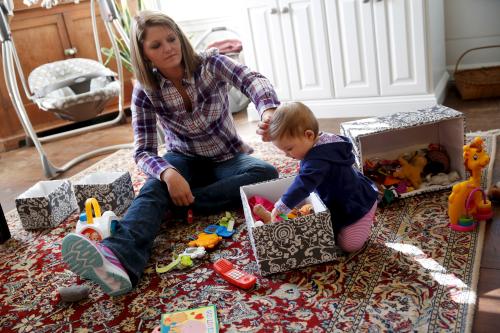
This is the third blog post for the 2018 series on paid family leave jointly sponsored by AEI and Brookings. Aparna Mathur at AEI and Isabel Sawhill at the Brookings Institution are the co-directors of the AEI-Brookings Project on Paid Family Leave. The project includes a diverse group of individuals from different organizations with expertise on this topic. Following our initial blog to tee off the series, we have invited each of the working group members to offer their thoughts on the topic.
We invite you to engage with us as the administration works to chart out policies on these topics. This will help us better inform policymakers of the practical day-to-day realities of living in a country where millions lack access to paid leave at the birth of a child or to meet other caregiving needs.
Beginning on October 1st, 2018, workers in Austin, Texas will have a new right: to paid leave for sick days, either for themselves or a close family member. Austin is the 31st city to adopt a paid sick leave policy – but the first in the South. (Nine states and two counties have also passed paid sick leave laws). The new provision, City Code Chapter 4-19, will allow workers to claim one hour of sick leave for every 30 hours worked, up to an annual cap of 64 hours for companies with more than 15 employees, and 48 hours for those with 15 or less.
There is a strong case, as made by my colleagues Eleanor Krause and Isabel Sawhill, for a federal sick leave policy. But in the current political climate, federal action seems unlikely, and in the meantime, a patchwork of different laws is growing up across the country.
Sick leave and family leave laws vary between different jurisdictions in a number of different ways – including in the way that they define “family.” Grandparents qualify for paid family leave in the State of New York; but not across the river in New Jersey. In Washington State, you can take time off to care for a sick sibling; but not in California. (See this very useful guide to some of the state paid family leave laws, from the National Partnership for Women and Families).
The definition used in the new Austin provision for sick leave is very broad. Section 4-19-1(e) reads: “FAMILY MEMBER means an employee’s spouse, child, parent, or any other individual related by blood or whose close association with the employee is the equivalent of a family relationship.”
The “any other individual related by blood” category is potentially very large, depending on how narrowly the term “related” is to be used. Including those “whose close association with the employee is the equivalent of a family relationship” widens the pool even further. At this point, the definition has also become circular, with a “family member” defined as a person with whom the employee’s relationship is “the equivalent of a family relationship.”
At the federal level, in the Healthy Families Act (H.R. 1516) sponsored by Rep. DeLauro (D-CT) would provide a right to paid sick leave, including to care for a sick “domestic partner.” But what does term “domestic partner” mean? According to H.R. 1516, it means “another individual with whom the individual is in a committed relationship.”
So: what counts as a “committed relationship”? H.R. 1516 provides an answer:
“A relationship between two individuals, each at least 18 years of age, in which each individual is the other individual’s sole domestic partner and both individuals share responsibility for a significant measure of each other’s common welfare. The term includes any such relationship between two individuals, including individuals of the same sex, that is granted legal recognition by a State or political subdivision of a State as a marriage or analogous relationship, including a civil union or domestic partnership.”
In a later section of the Bill (Section 5 b 3), acceptable use of the paid sick leave includes “an absence for the purpose of caring for a child, a parent, a spouse, a domestic partner, or any other individual related by blood or affinity whose close association with the employee is the equivalent of a family relationship.” (Those are my italics). As in the Austin law, the definition has circled back on itself.
The tortuous language makes many of these laws virtually impossible to enforce in terms of definitions. Should an employer wish to, they can check if somebody is married or has a child. The difference between a domestic partner, boyfriend or roommate will be difficult to prove.
The attempts in H.R. 1516 and the new Austin law to pin down an acceptable definition are exercises in futility. What if two people “share responsibility for a significant measure of each other’s common welfare” but prefer to live apart? What if two people end up living together out of economic necessity, even though their relationship is over? Who says only a “sole” person is allowed to play this role in my life?
The instinct behind many of these provisions is an inclusive one, especially with regard to same-sex couples. Some of the state plans pre-date the 2015 decision by the Supreme Court obliging all states to recognize same-sex marriage. But now that same-sex marriage is legal, these expansive definitions are arguably less necessary. That was, after all, part of the point of the campaign – to help secure the same legal rights for same-sex couples.
Right now, the attempts to define a family member in paid sick and paid family leave laws fall between two stools. They are too broad to be sensibly enforced, but still prescriptive enough to exclude some worthy cases. Why should I not be able to use some of my sick leave to care for my oldest, dearest friend from my church?
Lawmakers should either narrow their definition of family member so that it would have some chance of being enforceable in a court; or leave it to individuals to decide.
The narrowing option would mean restricting eligibility, for example, to spouses, rather than domestic partners or close associations or civil unions, given that lesbians and gay men can now choose to marry.
Better still, lawmakers should just get out of the business of attempting to delineate acceptable family relationships, and leave it the individual employee. Then any law could simply state that the sick leave could be taken by the worker for either their own sickness or “to care for another.”
If the government is to grant workers a right to time off to care for someone who is sick, perhaps it should also grant them the right to choose who most needs that care.
The Brookings Institution is committed to quality, independence, and impact.
We are supported by a diverse array of funders. In line with our values and policies, each Brookings publication represents the sole views of its author(s).








Commentary
Let workers decide who counts as ‘family’ for paid sick and family leave
February 20, 2018